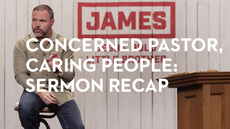Is anyone among you suffering? Let him pray. Is anyone cheerful? Let him sing praise. 14 Is anyone among you sick? Let him call for the elders of the church, and let them pray over him, anointing him with oil in the name of the Lord. 15 And the prayer of faith will save the one who is sick, and the Lord will raise him up. And if he has committed sins, he will be forgiven. 16 Therefore, confess your sins to one another and pray for one another, that you may be healed. The prayer of a righteous person has great power as it is working. 17 Elijah was a man with a nature like ours, and he prayed fervently that it might not rain, and for three years and six months it did not rain on the earth. 18 Then he prayed again, and heaven gave rain, and the earth bore its fruit.
19 My brothers, if anyone among you wanders from the truth and someone brings him back, 20 let him know that whoever brings back a sinner from his wandering will save his soul from death and will cover a multitude of sins.
Introduction
When life isn’t going your way, and you know you should make some personal changes, hearing advice is never enough. Good information has to be coupled with actual ability in order to be helpful. So it is when we’re stuck. Rules in and of themselves are unable to produce the obedience that they demand. Fortunately, James reminds us that through prayer, God is able to do what we are unable to do for ourselves.
The majority of James’ letter is a list of dos and don’ts, and applying James’ lessons to ourselves in the here and now is emotionally weighty because we have failed to obey these commands, and our troubles often come from the sin in our own hearts (James 1:14; 4:1). But in his wisdom and kindness, James ends his letter with a breath of fresh air. He goes beyond mere dos and don’ts and tells us how to remain steadfast under trial until the coming of the Lord—by praying and looking out for one another as brothers and sisters in Christ.
James doesn’t ask us to do something that he’s not familiar with. He speaks to us as one who knows how to endure. History tells us that James spent so much time in prayer that his calloused knees looked like a camel’s! Throughout his life, James would have witnessed his half-brother Jesus withdraw to desolate places to pray (Luke 5:16). Though James gives us many hard words in his letter, he does it with the heart of a pastor who prayed for his people and remained steadfast unto death. Let’s learn from old “Camel Knees” about the way a heart devoted to God expresses itself in prayer.
Observation
- In this final section of his letter, James shows us how inward faith and love of God displays itself outwardly. James gives five occasions in verses 13–16 and in 1:5 indicating times we should pray. What are they?
- What does James say praying in faith will accomplish? (v. 15–16)
- Whose prayer “has great power”? (v. 16)
- What ought we to do for one another (5:16, 19–20)?
Interpretation
- The Bible never teaches us a formula of prayer but rather gives us models. Prayer’s effectiveness doesn’t depend on using the right words or achieving spiritual maturity. There is no perfect way to pray that will result in getting our every desire met. Though James appears to promise that if we pray correctly, we will be healed and our prayers will “work,” he actually shows us what a heart devoted to God is like—increasing alignment with God’s will as it’s reflected in prayer.
- James tells us to pray during times of suffering and times of joy. Read 1 Thessalonians 5:16–18, Ephesians 6:18, Philippians 4:4–7, and Colossians 4:2–4. In what circumstances does the Bible instruct us to pray?
- In James 5:15, “the prayer of faith” does not refer to a specific prayer to recite but faith in the One to whom we pray. Read Mark 14:32–42. Surely the sinless Jesus would have prayed “correctly.” Did the Father give him a “yes”? Read Hebrews 12:2. Why was Jesus OK with getting a “no”?
- In James 5:16, the “righteous person” refers to more than just someone who obeys God. It reflects the position of this person’s heart as thinking, feeling, and acting entirely in step with God’s will. James gives us the example of Elijah in verse 17. Read 1 Kings 18:37, 41–44. Consider also the example of Job in Job 42:1–6 and Jesus’ instruction to his disciples in Matthew 6:5–15. How do these passages describe a righteous person’s prayer?
- James ends his letter by exhorting us to pray for one another (5:16) and to bring back someone who has wandered from the truth (5:19–20). Read Colossians 1:9–10, Ephesians 1:16–18, and 1 Timothy 2:1–4. What else does the Bible say about the power of praying for each other? Why would James end his letter this way?
Application
- We’ve read about prayers of thanksgiving, praise, supplication, intercession, and repentance. Which ones do you tend toward? Which ones do you neglect?
- In the introduction, we learned that James’ nickname was “Camel Knees” because he spent so much time in prayer for others. Who do you tend to pray for the most, yourself or others? Who could you be praying for by name?
- James tells us that trials ought be a source of joy, for “the testing of your faith produces steadfastness” (1:2–3). He also assures us that, even in our trials, God has a purpose and is compassionate and merciful (5:11). As difficult as it might be, where do you see these things in your life currently?
- Read Revelation 21:1–5. How does this eternal perspective apply to living out your faith in works? How does it change your perspective on your current trials?
- In verse 16, James exhorts us to confess our sins to one another. In what way is this related to healing, forgiveness, and righteousness? Do you have people in your life to whom you confess your sins? Who pray for you? Why is this an important expression of community in the church?
This devotion is adapted from the James Study Guide. Pick up a copy today for only $9.99. The Study Guide includes a 15-week curriculum, a small group study, a group inductive study, as well as 75 daily devotions for your personal or family worship.
















